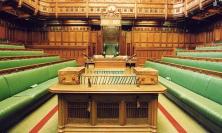Continuing Thinking Faith’s series of Party political articles ahead of this week’s UK General Election, President of Hornsey and Wood Green Conservatives, David Grant argues that to choose the Common Good is to vote for the Conservatives. In looking at the concept of the Common Good, he claims that the Conservative promotion of a ‘Big Society’ best embodies the solution to the social problems facing our communities and our country today.
The 2010 General Election is being fought against a background of disillusionment with politicians and politics. As a result, voting intentions are at their most volatile and the televised leaders’ debates are exerting an influence that can be seen as disproportionate. Many voters seem to be looking for inspiration in presentational successes and incidental events. What is clear is that even the most dyed-in-the-wool, habitual supporters of individual parties are no longer willing to ‘follow like a puppy dog’, to borrow the famous phrase of St Ignatius Loyola.
Values matter
The danger inherent in political cynicism and shallow slickness is that people can be diverted from the immensely important choices that it is their democratic responsibility to make. That is why voices from outside the political crucible can make an invaluable and irreplaceable contribution to the debate as the election approaches. In particular, Choosing the Common Good, the document produced by the Bishops’ Conference of England and Wales, serves as a salutary resource for Catholic voters as we strive to lift our eyes from the hubbub of the day-to-day campaign and to focus on the prospects for the life of our nation and our world that will flow from the outcome of this delicately-poised election. The values of each potential government – as well as the leadership enshrining them – will have a very big impact on the lives of all of the people of our country, long after the campaign headlines have been forgotten. This is probably truer now than it has been for decades, given the enormous economic, social and moral decisions that need to be made. It is therefore especially appropriate to examine the approach of the respective parties in the light of the timeless values emphasised in the bishops’ statement. As a Conservative, I am delighted to do so from the perspective of my own Party and its principles.
First, it is right to highlight my Party’s conviction that, just as values matter, faith matters too. Christians – and perhaps especially Catholics – have increasingly felt marginalised and even victimised by elements of the politico-judicial culture that has developed in recent years. Symptoms that have appeared on the surface include the prohibition on the wearing of modest Christian symbols in the workplace, and even the astonishing and appalling spoof Foreign Office memo on the Pope’s visit. Matters of important overall policy have also been affected. It is imperative that faith communities be accorded due respect, and David Cameron’s explicit intention to encourage the role of religious entities, together with other voluntary groups, in the provision of social and educational services is greatly to be welcomed.
The values of realism and honesty in government are stressed by the bishops in expressing their wish to see trust restored in politics. Here again the Conservative Party is in tune with Choosing the Common Good through its emphasis on the importance of a ‘Big Society’ rather than ‘Big Government’. The power of government can be focused on doing well those things that only government can undertake, rather than being dissipated amongst too wide a range of activities and interventions, which are thus likely to be unsuccessful. This realism, coupled with changes to the way Parliament works – including a reduction in its size – should, over time, make a major contribution to the restoration of trust. It should also produce more fairness in the ways in which voters judge political parties themselves, prompting us all to examine politicians’ credible aspirations rather than being tempted to judge them according to some wholly outmoded social or other prejudice.
A coherent approach
The concept of the Common Good is defined in the Catechism of the Catholic Church as ‘the sum total of social conditions which allow people, either as groups or as individuals, to reach their fulfilment more fully and more easily’ (Catechism of the Catholic Church 1906). It depends, in other words, on releasing the human spirit and potential of individual people, families and groups so that, in the words of Choosing the Common Good, ‘Every person is called upon to develop and fulfil themselves’. There is a quite remarkable overlap between this ‘big idea’ and that of the Conservative Party’s ‘Big Society’, which looks to nurture, mobilise and encourage the generosity, individual talent, civic pride and sense of community which have all-too-often become latent in the Great Britain of today. This implies not only finding local, community-based solutions for problems that government can be too remote to tackle effectively; it also provides the framework for a more sensitive and powerful means of protecting and supporting the deprived and vulnerable, with government acting in partnership with voluntary organisations, including faith groups.
The urgency with which fresh solutions to the country’s social problems must be sought is reinforced by the rapidly increasing recognition that, in so many respects, Britain is indeed broken. The Conservative Party’s promotion of greater individual self-reliance and of community interdependence responds very precisely to the bishops’ assertion that ‘…systemic flaws in the economy cannot be repaired unless it is recognised that they stem from, and contribute to, equivalent flaws in our wider society.’ Closely linked to this point is the need to enhance respect for law. A system of laws corresponding more closely than can seem true at present with the requirements and heritage of our country might be expected to command more support, and the Conservative Party’s intention to explore the possibility of creating a national Bill of Rights is to be applauded. Government can and should work more closely with the grain of people’s needs and ambitions. It is indispensable that, in tandem with more efficient, smaller central administration, a much more locally-based structure for supplying services in line with local priorities and wishes should be introduced. The idea of localism, firmly espoused by the Conservative Party as part of the ‘Big Society’ philosophy, will, if boldly implemented, contribute very potently to the reinforcement of the Common Good.
Supporting good citizenship; freeing the resources of government to achieve tasks that can only be accomplished by government; providing more effective and sensitive support to the needy and the vulnerable: these are all intrinsic elements in the Conservative Party’s promulgation of the ‘Big Society’. This carefully considered, exciting and coherent concept, which provides the philosophical thrust behind the Party’s whole programme for the next Parliament, has to an extent become submerged by the news coverage of the day-to-day alarms and excursions of the election campaign. However, it amply repays detailed exploration, particularly, perhaps, by Catholics, who will readily appreciate its consonance and compatibility with the powerful message of Choosing the Common Good.
Policies for the Common Good
Political beliefs, values and big ideas can in themselves be entirely admirable, but they are of little practical benefit to the governance of a nation unless they find expression in consistent, understandable and effective policies. Catholics have, as do all citizens, a direct interest in the whole gamut of policy. In areas of special concern to us because of our faith, Conservative proposals go a very long way towards addressing our preoccupations. They also provide practical steps in order to meet the priorities enumerated by the bishops.
Economic and financial policy is, of course, the keynote of this election. Honesty in facing the need to begin reducing the nation’s debt has been the hallmark of the Conservative approach, coupled with a recognition of the extreme folly of impeding growth by attacking employment. At the same time, core areas of public spending will be protected, whilst waste is excised. In the banking system, bad regulation must be replaced by good regulation, in order to encourage the virtue whose reinforcement is rightly desired by the bishops.
Family policy is at the heart of Conservative social priorities, an emphasis which echoes that to be found in Choosing the Common Good, where the bishops state that ‘Politicians of all parties should recognise and support marriage as a key building-block of a stable society.’ As a Conservative, I am very proud that my Party has unequivocally done just that. Whilst the capacity to give some necessary financial underpinning to marriage is limited by the immediate economic constraints, there is no doubt that our support for marriage – savagely attacked though it has been – puts us squarely on the right side of this argument.
The linked area of care for the elderly is another to which the bishops give emphasis. The Conservative Party has put forward a government-sponsored, insurance-based scheme to enable the elderly and their families to overcome the worst miseries that can be inflicted by the need for long-term care. Much more detailed discussion is required in this area, but it is plainly right to be taking a serious and practical look at ways of providing a sustainable framework to ensure the comfort and dignity of our ageing population.
Education is fundamental to the achievement of the Common Good. Catholic Schools, often amongst the most successful within their areas, have been badly treated by successive codes of practice on admissions, and have generally felt under attack. This must stop, and David Cameron’s warmly-expressed support for faith schools is most welcome. The interest taken by the Catholic bishops – as well as by many distinguished head teachers – in the Conservative proposal for Free Schools demonstrates the extent to which the Party’s policy chimes with the bishops’ determination to safeguard and to promote excellence in schools. Increased independence for good schools is now widely regarded as an indispensable means to this end. Greater equality of opportunity and, to borrow the resonant phrase used by the bishops (drawing on Pope Benedict XVI’s encyclical, Caritas in Veritate), ‘integral human development’ must be rooted in robust, high quality education. Far too many of Britain’s children are currently receiving a raw deal from the system.
International Aid and Development represent a field of policy which is also highlighted in Choosing the Common Good. Again, I am proud of the stance adopted by the Conservative Party in ring-fencing expenditure on aid. The Party’s consistency in challenging conditions of trade that harm developing countries gives additional grounds for optimism.
Migration remains a highly delicate matter, and the bishops are right to enjoin caution in the way it is discussed. Openness and rationality are, however, the friends of justice. The bishops agree that ‘…government has a responsibility to manage migration effectively…’; the problem is that the management of migration has been anything but effective. This has led to severe problems in some communities, and has certainly militated against ‘…the recognition of this human dignity and the inalienable rights that flow from it’, to quote again from the relevant passage in the bishops’ statement. The Conservative Party has had the courage to propose an immigration policy that is at once humane, sensitive and rigorous. I believe that it should be supported by all who seek good community relations.
The Environment has proved a controversial area of policy for all parties. It is to David Cameron’s great credit that he has continued to promote environmental protection and measures to combat global warming, despite much sniping. He has ensured that Conservative Party policy has remained aligned with the concerns of the Catholic bishops.
Choosing the Conservatives
The next British Government will face a huge wall of complex and often unprecedented problems. Big, far-reaching decisions will need to be taken, and hardship will be inescapable. A maze of repercussions will have to be negotiated, and no party can claim to have a full, ready-made set of responses to all the eventualities that will arise. Candour and honesty will be the keys to survival and ultimate success. They must, however, be underpinned by clear and effective policies, informed by a coherent philosophy.
The Catholic bishops are to be applauded for having encapsulated in Choosing the Common Good an exposition of the imperatives and the priorities that flow from the moral teaching of the Church. As a Catholic and a Conservative, I am reassured and profoundly encouraged by the resemblance and the compatibility that I find between the teachings of the Church and the principles and policies of my Party. I very much hope that my fellow-Catholics will find this analysis helpful as they decide on how to vote in this extremely important General Election.
However each of us votes, let us focus clearly on our principles and our beliefs, ignoring as far as we can the flummery of the day-to-day campaign. That wonderful verse from the Book of Proverbs quoted in Choosing the Common Good puts it best: ‘Where there is no vision, the people perish’.
David Grant is the President of Hornsey and Wood Green Conservatives, and a former Parliamentary candidate for the Conservative Party.
The views expressed here do not necessarily represent those of the British Province of the Society of Jesus.
![]() Choosing the Common Good
Choosing the Common Good![]() Conservatives
Conservatives
Also on Thinking Faith:
![]() Liberal Democrats and the Common Good
Liberal Democrats and the Common Good![]() Labour and the Common Good
Labour and the Common Good






